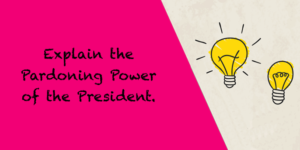Know Important facts about Pardoning Powers Of President
The Article provides information all about What are the pardoning powers of the President, Different types of pardons, and difference between pardoning powers of President and Governor.

Read More: Important Organisations of the Indian National Movement
Read more: Peasant Revolts of Indigo, Pabna and Deccan
Article 72 says that the President shall have the power to grant pardons, reprieves, respites or remissions of punishment or to suspend, remit or commute the sentence of any person convicted of any offence. Now it is important to understand the difference between the types of Pardon i.e. between Pardon, Commutation, Reprieve & Respite.
- Pardon–A pardon completely absolves the offender from all sentences and punishment and disqualifications and places him in the same position as if he had never committed the offence.
- Commutation– Commutation means exchange of one thing for another. In simple words to replace the punishment with less severe punishment. For example, for Rigorous imprisonment-simple imprisonment.
- Reprieve– Reprieve means temporary suspension of death sentence. For example- pending a proceeding for pardon or commutation.
- Respite– Respite means awarding a lesser punishment on some special grounds. For example- the Pregnancy of women offender.
- Remissions– Remission means the reduction of the amount of sentence without changing its character, for example, a sentence of 1 year may be remitted to 6 months.
The President can exercise these powers:
- In all cases where the punishment or sentence is by a court martial;
- In all cases where the punishment or sentence is for an offence against any law relating to a matter to which the executive power of the Union extends;
- In all cases where the sentence is a sentence of death.
The pardoning power of President is wider than the governor and it differs in the following two ways
The power of the President to grant pardon extends in cases where the punishment or sentence is by a Court Martial but Article 161 does not provide any such power to the Governor.
The President can grant pardon in all cases where the sentence given is sentence of death but pardoning power of Governor does not extend to death sentence cases.
Important facts:
- This power of pardon shall be exercised by the President on the advice of Council of Ministers.
- The constitution does not provide for any mechanism to question the legality of decisions of President or governors exercising mercy jurisdiction.
For more such informative articles stay tuned to OWN Guru.
